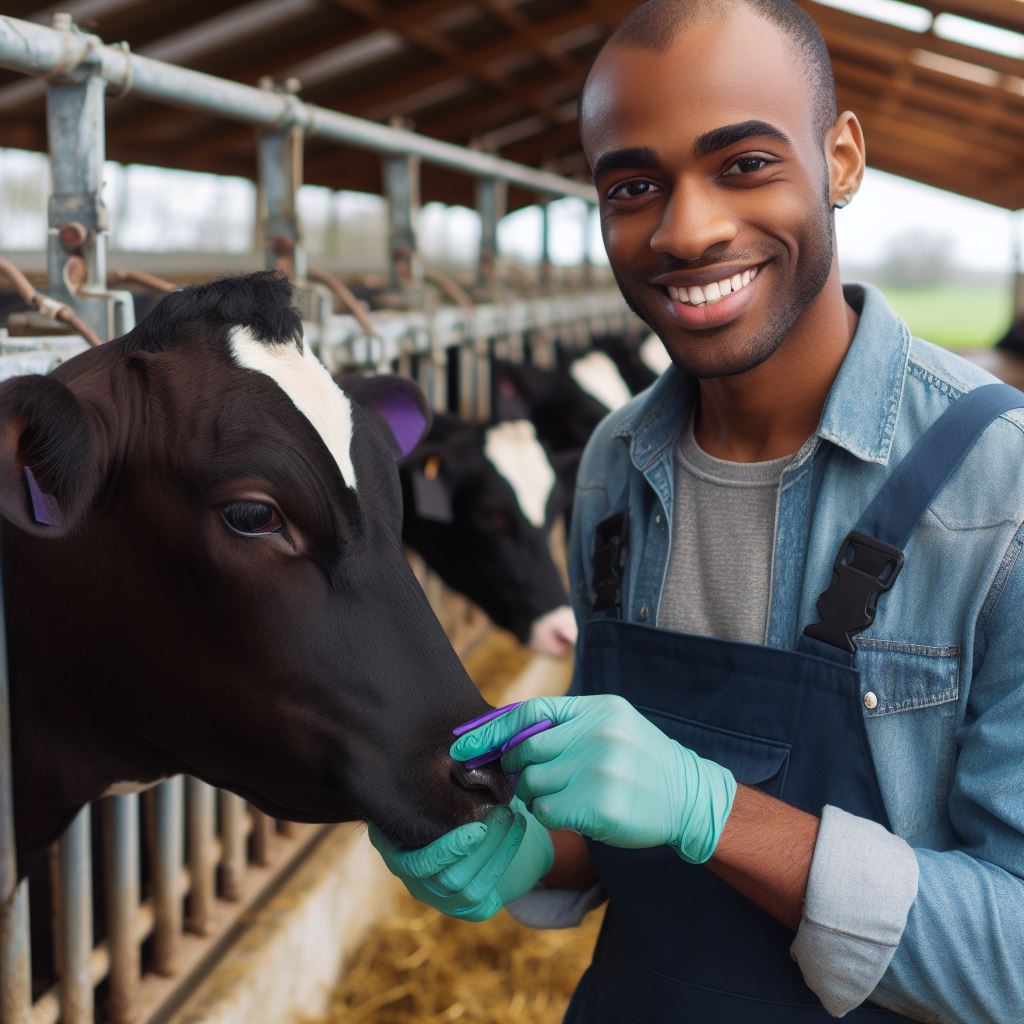Introduction
Industry collaboration between universities and farms plays a crucial role in the advancement of the agricultural sector.
By working together, universities and farms can benefit from each other’s expertise and resources, leading to mutual growth and development.
This blog post will explore the importance of industry collaboration and how it can bridge the gap between universities and farms, ultimately benefiting both parties and the agricultural sector as a whole.
Collaboration between universities and farms allows for a transfer of knowledge and research findings.
Universities have access to cutting-edge research and technology, while farms possess practical agricultural knowledge and experience.
By combining these strengths, innovative solutions can be developed to address challenges in the agricultural industry.
Furthermore, industry collaboration facilitates the implementation of research outcomes on farms.
Farmers can directly benefit from the practical applications of university research, while universities can gain valuable insights from farmers regarding the real-world effectiveness of their findings.
This feedback loop ensures that research remains relevant and useful to the agricultural community.
Collaboration also opens up opportunities for joint funding and grants.
Universities and farms can collaborate on research projects and advocacy initiatives, increasing their chances of securing financial support.
By pooling resources and expertise, both parties can achieve advancements that would be difficult to accomplish individually.
In essence, industry collaboration between universities and farms serves as a catalyst for progress in the agricultural sector.
By leveraging each other’s strengths and working together, universities and farms can bridge the gap, leading to mutual benefits and advancements that drive the industry forward.
Challenges in the Agriculture Sector
Lack of practical skills and knowledge among university graduates
Many agriculture graduates lack hands-on experience due to theoretical-focused curriculum.
Theoretical knowledge alone is insufficient for addressing practical challenges faced by the farming industry.
Graduates without practical skills struggle to adapt to the demands and realities of the farming sector.
Lack of practical knowledge hampers innovation and limits the implementation of advanced farming techniques.
Bridging the gap between universities and farms is crucial in equipping graduates with practical skills.
Insufficient research initiatives that address real-world farming problems
Universities often prioritize research that aligns with academic interests rather than practical farming needs.
Limited funding and resources are allocated to research initiatives focused on real-world farming problems.
Without adequate research addressing industry challenges, farmers struggle to adopt innovative techniques.
Collaborative projects between academia and industry can help ensure research addresses practical farming problems.
Universities and farms must work together to identify research gaps and prioritize practical solutions.
Limited communication and interaction between academia and industry
Communication gaps between academia and industry hinder the transfer of knowledge and understanding.
Limited interaction prevents academia from understanding the real-world challenges faced by the farming industry.
Industry professionals have valuable expertise and experience that can enhance academic curriculum and research.
Establishing regular channels for communication and collaboration can bridge this gap effectively.
Collaboration between academia and industry allows for the exchange of knowledge, fostering innovation in agriculture.
Outdated curriculum and teaching methodologies
Traditional teaching methods may not adequately prepare students for the evolving needs of the agriculture sector.
Curriculum must be regularly updated to align with advancements in farming technology and practices.
Practical components, such as internships and fieldwork, should be integrated into the curriculum.
Industry collaborations can provide insights that help identify necessary curriculum updates and teaching methodologies.
Embracing innovative teaching methods ensures graduates have the skills required to excel in the agriculture sector.
In fact, bridging the gap between universities and farms is crucial to address the challenges faced by the agriculture sector.
Inadequate practical skills and knowledge, insufficient research initiatives, limited communication, and outdated curriculum hamper progress and innovation.
Collaborative efforts between academia and industry can help overcome these challenges, equipping graduates with the necessary skills and knowledge to contribute effectively to the farming industry.
It is imperative to prioritize industry collaboration and foster communication channels to bridge this gap for the future development of the agriculture sector.
Read: Overcoming Challenges in Animal Breeding Research in Nigeria
Benefits of Industry Collaboration
Industry collaboration plays a crucial role in bridging the gap between universities and farms
Transform Your Career with Expert Guidance
Get personalized mentorship consulting that’s tailored to your unique path. Our expert advice is actionable and exclusive.
Get StartedBy working together, universities and farms can reap numerous benefits that positively impact the agricultural sector.
In this section, we will explore some of the key advantages of industry collaboration.
Enhancing practical skills and knowledge of students
One of the major benefits of industry collaboration is the enhancement of practical skills and knowledge among students.
While theoretical learning is important, practical exposure is equally crucial.
By engaging with farms and industry professionals, students gain hands-on experience in various farming practices, including crop management, livestock care, and machinery operation.
Through internships, apprenticeships, or collaborative research projects, students are able to witness firsthand the challenges and complexities faced by farmers.
This practical experience enriches their understanding of agriculture and equips them with the necessary skills to succeed in the field.
Improving research relevance and application in farming practices
Collaboration with industry provides universities with valuable insights into the practical needs and requirements of farmers.
By working closely with farmers, researchers gain a deeper understanding of the real-world challenges faced by the agricultural community.
This knowledge enables universities to conduct research that is directly relevant to the farming practices and addresses the pressing issues of the industry.
Collaborative research projects allow for the development of innovative solutions that can be implemented on farms to improve efficiency, sustainability, and productivity.
Fostering innovation and technological advancements in agriculture
Industry collaboration serves as a catalyst for innovation and technological advancements in the agricultural sector.
Farms often possess practical knowledge and hands-on experience that can be leveraged to drive innovation in farming practices.
By sharing expertise and resources, universities and farms can collaborate on research and development projects to create new technologies, improve existing practices, and promote sustainable farming methods.
This collaboration enhances the overall competitiveness and productivity of the agricultural sector.
Promoting entrepreneurship and job creation in the sector
Industry collaboration between universities and farms creates opportunities for students to explore entrepreneurship and contribute to job creation in the agricultural sector.
Through collaboration, students can gain the necessary skills, knowledge, and network to start their own agricultural ventures.
They can leverage the expertise and guidance provided by industry professionals to develop innovative business models and enter the market as successful agricultural entrepreneurs.
This entrepreneurship not only generates employment opportunities but also stimulates economic growth in rural areas.
It encourages young talents to invest in agriculture, leading to the overall development and sustainability of the sector.
In short, industry collaboration plays a crucial role in bridging the gap between universities and farms.
The benefits of such collaborations are immense, including enhanced practical skills and knowledge of students, improved research relevance and application in farming practices, fostering innovation and technological advancements, and promoting entrepreneurship and job creation in the agricultural sector.
It is essential for universities and farms to continue working together to drive the growth and development of the industry.
Read: Challenges Faced by Students in Animal Production in Nigeria

Strategies for Encouraging Industry Collaboration
To bridge the gap between universities and farms, fostering robust partnerships is pivotal.
Active collaboration breeds innovation and accelerates progress in the agricultural sector.
Establishing partnerships between universities and farms
- Sharing Resources and Expertise: Pooling resources like technology, facilities, and knowledge enhances efficiency and effectiveness.
- Collaborating on Research and Development Projects: Joint initiatives spark innovation, leading to breakthroughs benefiting both academia and farming.
- Providing Internship and Practical Training Opportunities for Students: Hands-on experience cultivates skilled professionals ready for real-world challenges.
Engaging industry experts in academic discourse enriches perspectives, guiding educational strategies in practical directions.
Tailoring curricula to industry demands equips students with up-to-date knowledge and skills, ensuring their readiness for the field.
Organizing joint workshops, conferences, and seminars to facilitate knowledge exchange
These events serve as platforms for the exchange of insights, fostering a culture of continuous learning and collaboration.
Universities can initiate partnership programs, inviting farms to collaborate on specific projects, while farms can open their doors to academic involvement, encouraging joint research initiatives.
Industry representatives, when included in academic boards or committees, offer valuable input on curriculum design and research focus, aligning academic pursuits with practical industry needs.
Integrating industry-specific modules within university courses ensures that graduates possess relevant skills, enabling a seamless transition into the workforce.
Joint workshops, conferences, and seminars provide spaces for idea exchange, encouraging dialogue between academia and industry players.
These events can be hosted alternately by universities and farms, promoting a balanced exchange of perspectives.
In general, collaborative efforts between universities and farms strengthen the foundation of agriculture.
These strategies foster mutual growth, facilitating a symbiotic relationship beneficial to both sectors.
Read: Top Universities in Nigeria for Studying Animal Production
Successful Examples of Industry Collaboration
Case study 1: University Farm Partnership Program
- The program’s objectives and achievements: The University Farm Partnership Program aimed to bridge the gap between academia and agriculture by facilitating collaboration between universities and farms.
- Impacts on student learning outcomes and agricultural innovation: Through hands-on experiences, students learned practical skills and gained a deeper understanding of farming practices, leading to enhanced academic performance and innovative solutions in agriculture.
Case study 2: Research Consortium for Sustainable Farming
- The consortium’s goals and activities: The Research Consortium for Sustainable Farming focused on bringing together industry experts, researchers, and farmers to address sustainability challenges in agriculture.
- Positive outcomes in addressing real-world farming challenges: The consortium’s collaborative efforts resulted in the development of sustainable farming practices, improved resource management, and increased profitability for farmers.
Read: Guest Lectures: Global Experts on Nigeria’s Animal Genetics Scene
Conclusion
Industry collaboration between universities and farms holds immense importance and numerous benefits.
By working together, both entities can leverage their strengths and expertise to drive innovation, research, and development in agriculture.
This collaboration is crucial in bridging the gap between academia and industry, as it ensures that agricultural practices are based on scientific research and meet the practical needs of farmers.
It is essential for universities, farms, and stakeholders to actively promote and support industry collaboration.
This can be done by establishing partnerships, conducting joint research projects, and facilitating knowledge transfer between academia and the farming community.
By actively engaging in industry collaboration, universities can enhance the relevance of their research, contribute to the growth of the agricultural sector, and equip students with practical skills and knowledge.
Similarly, farms can benefit from the latest advancements in technology, techniques, and sustainable practices.
Industry collaboration has the potential to reshape the future of agriculture in Nigeria.
It can lead to increased productivity, improved food security, and sustainable agricultural practices.
With the collective efforts of universities, farms, and stakeholders, the agricultural sector can thrive and contribute to the overall development of the country.
Industry collaboration between universities and farms is not just a necessity but a pathway to sustainable agricultural development.
It is time for all stakeholders to come together, bridge the gap, and actively support industry collaboration for the betterment of agriculture in Nigeria.




